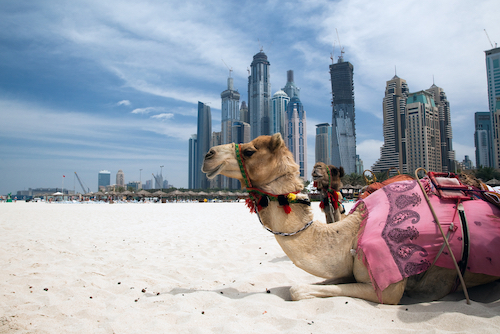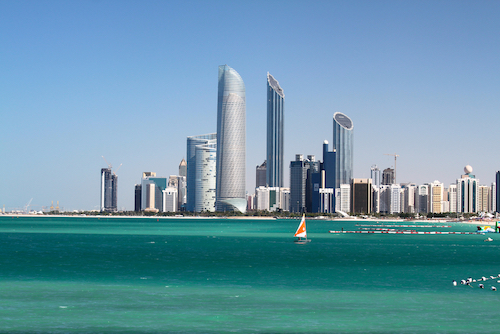The United Arab Emirates (UAE) is made up of seven emirates: Abu Dhabi, Ajman, Sharjah, Dubai, Fujairah, Ras Al Khaimah and Umm Al Quwain. The official language of business is English and around 85% of the population are expats.Whilst opportunities for work exist in each of the seven emirates, the majority are to be found in Abu Dhabi and Dubai. The cost of living is expensive but is matched by high standards, meaning you get good value for money.
The culture is largely Islamic, and it is important to respect local laws and customs to avoid penalisation. For example, sexual relations outside of marriage are illegal, as are same-sex unions. Alcohol may only be consumed with a licence and women should dress modestly in public spaces. Both swearing and kissing in public are also arrestable offences.
The UAE economy is currently strong and has seen unparalleled growth in recent years. Major local industries include:
• Aluminium
• Ship repair
• Fishing
• Construction
• Textiles
• Petroleum
There are several skills shortages listed in the UAE, many of which are in the science, technology, engineering and mathematics (STEM) sectors. Having recently introduced VAT, there is also a high demand for tax specialists.

Many expats find work in the UAE via international companies in their home countries and this is a great option as it is best to secure work before you move. Alternatively, numerous vacancies in the UAE are advertised via recruitment agencies or online. Some of these may specify that applicants fulfil certain age or gender requirements; whilst this may be unusual in your home country, it is perfectly acceptable practice in the UAE.
Job Vacancies
Networking is an important way to find work in the UAE but can be almost impossible from outside the region. However, once resident in one of the emirates, it can be a good way to gain promotion.
Speculative applications are welcome but only usually successful if you have strong personal links to or contacts within the company. Most applications are made online using an application form or CV. Attaching a short cover letter and photograph is best practice. Keep your CV brief, factual and interesting to stand out from the crowd. Most job offers are made following a face-to-face interview and medical examination.
Short-term contracts are commonplace in the UAE, particularly in the construction, oil and tourism sectors. Temporary work may be available in hospitality sectors of places such as Dubai, which welcome vast numbers of tourists each year.

Volunteering opportunities in the UAE are limited and often only available in Dubai and Abu Dhabi. You can search for opportunities at volunteers.ae.
There are many teaching jobs available in the UAE, despite English being the main second language. If you hold a TEFL or TESOL qualification, you will be able to find work in schools, colleges, universities and language centres. Some school jobs may also require the applicant to have a degree or PGCE.
Visas for visiting the UAE are issued on arrival for all UK citizens; these are valid for 30 days. The emirate you are residing in can then extend the visa for a further 30 days, up to three days before its expiry date. At the end of this extended period, you must then leave the country, unless you find employer sponsorship during your stay. Your passport must also have at least six months validity from the date you enter the country.
In order to work in the UAE, you must be sponsored by an employer – you cannot work on a tourist visa. Upon acceptance of a job offer, your employer will apply for a residency visa on your behalf. Once granted, you will then be able to apply for a work permit from the Ministry of Labour. It is illegal to work without this permit.

Residency visas are subject to a medical examination. Those who test positive for conditions such as HIV and hepatitis will be deported.
It is important to remember to cancel your work visa before permanently leaving the UAE; failure to do so could result in your being reported as an absconder. This would lead to you being arrested upon return to the country.
While your work visa is being processed, you will need to submit your medical records, passport, photo, job offer letter and visa application to the Department of Health and Medical Services. Once processed, you will be issued with a health card. You will also need a labour card, which involves sending your passport, photo, employment contract, entry visa, medical records and your employer’s labour licence to the Ministry of Labour.
The main language of the UAE is Arabic, with English, Hindi, Persian and Urdu all widely spoken. As the number of expats in the country has grown, English has become more commonly used and is now the language of business. Understanding Arabic is not essential but would greatly improve your job prospects.

Full-time employers in the UAE typically work five 8-hour shifts in succession each week. However, unlike in much of the Western world, the working week runs from Sunday to Thursday, with Friday and Saturday the standard rest days. Working hours are reduced during Ramadan.
There are nine public holidays in the UAE, though the dates for some of these change year by year. These include:
• New Year’s Day
• Ascension Day
• Eid Al Fitr
• Arafat Day
• Eid Al Adha
• Al Hijri
• Birthday of Prophet Mohammad
• Commemoration Day
• National Day
Employees are also entitled to 30 days of annual leave after completing their first year in a job.
Would you like to share your experience of life abroad with other readers? Answer the questions here to be featured in an interview!

